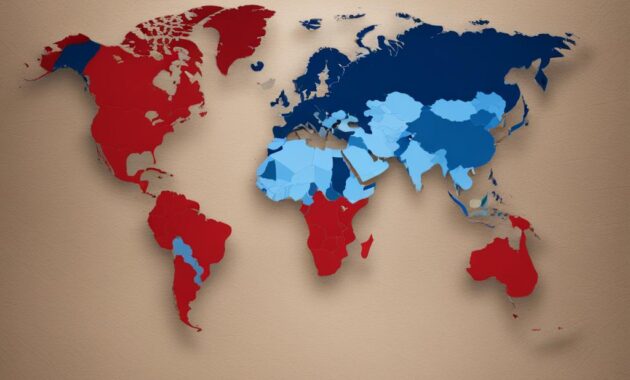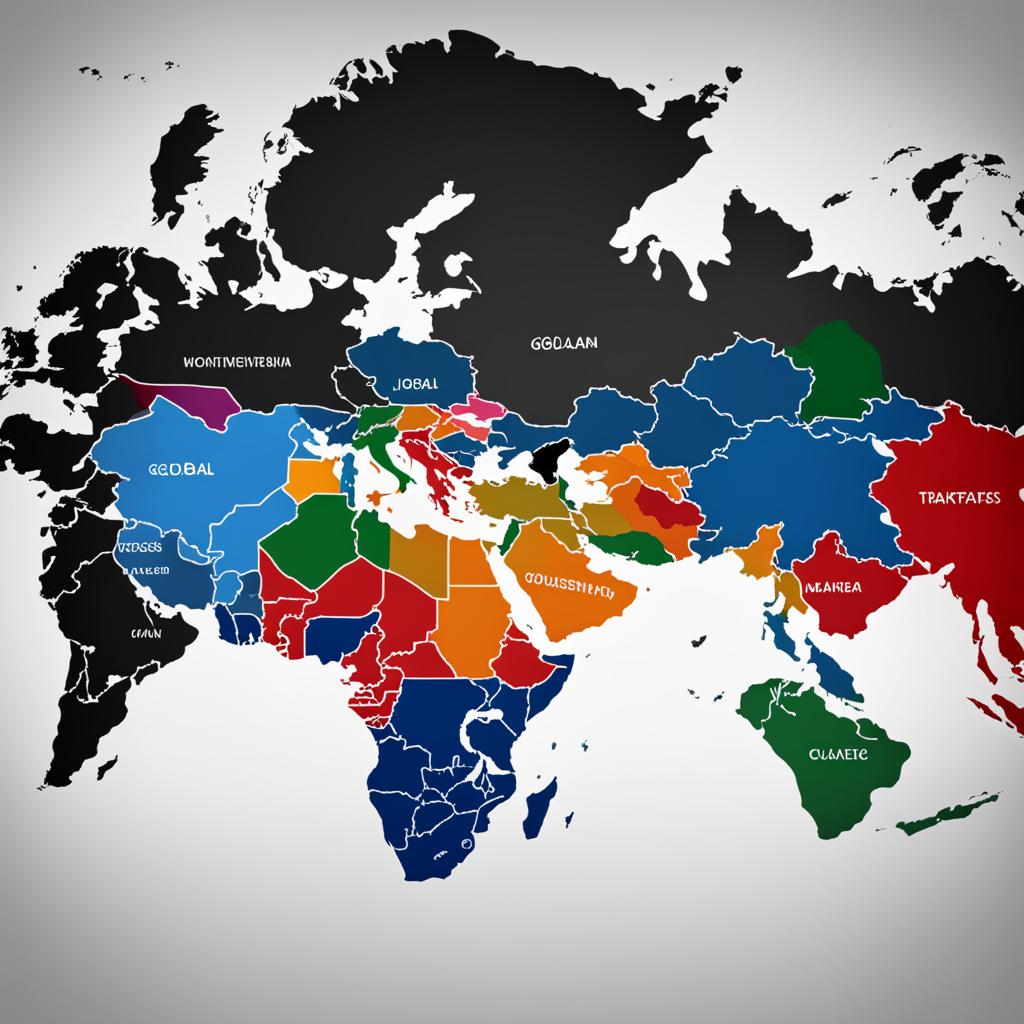As professional copywriting journalists, we understand the significant role of tariffs and trade barriers in affecting global business. Tariffs, or taxes on imported goods, and trade barriers, such as quotas and embargoes, are prevalent in international trade. These barriers can have a significant impact on the economy, market access, and industry-specific operations.
It is crucial to understand the implications and impact of tariffs and trade barriers, especially in the United States. As the world’s largest economy, the U.S. plays a critical role in shaping international trade policy.
Over the years, the U.S. has implemented various trade policies and protectionist measures to safeguard domestic industries and jobs. These measures include import tariffs, embargoes, and anti-dumping regulations. While the intended benefits of such policies may include safeguarding national interests, increasing domestic production and employment, and reducing dependence on foreign goods, they can have unintended consequences.
In this section, we will explore the definition, types, and examples of tariffs and trade barriers, both in the global context and specifically in the United States. We will also discuss the economic impact of these barriers, such as increased costs, decreased market access, and disrupted global supply chains.
Our goal is to provide a comprehensive understanding of tariffs and trade barriers’ role in global business and their implications for the U.S. economy. With this knowledge, we can better navigate the complexities of today’s interconnected global economy.
Understanding Tariffs and Trade Barriers
Before we investigate the impact of tariffs and trade barriers on global business, it’s important to understand what they are and how they work. Tariffs are taxes imposed on imported goods, which are intended to make foreign products more expensive and less attractive than domestic alternatives. In contrast, trade barriers refer to any government-imposed restriction on international trade, including tariffs, quotas, embargoes, and licensing requirements.
There are several types of trade barriers, each with its own unique implications for global business. Some of the most common types are:
- Tariffs: As mentioned earlier, tariffs are taxes levied on imported goods. They can take several forms, including ad valorem tariffs (which are based on the value of the product) and specific tariffs (which are based on the quantity of the product).
- Quotas: Quotas limit the quantity of a particular product that can be imported into a country during a specified period. They are usually implemented to protect domestic producers or to prevent the import of certain goods for political or security reasons.
- Embargoes: Embargoes are a complete ban on imports or exports of particular products or with specific countries. They are often used for political reasons, such as to put pressure on another country to change its policies.
- Licensing requirements: Licensing requirements refer to the various regulations and administrative procedures that companies must comply with to import or export goods. These can include product testing, safety standards, and customs procedures.
Examples of each type of trade barrier can be seen in the table below:
| Trade Barrier Type | Description | Example |
|---|---|---|
| Tariff | A tax imposed on imported goods | The United States imposes a 25% tariff on steel imports from China |
| Quota | A limit on the quantity of a particular product that can be imported over a specific period | The European Union places a quota of 40,000 tons on Japanese automobiles imported into the EU |
| Embargo | A complete ban on imports or exports of certain products with specific countries | The United States imposes an embargo on all imports and exports with North Korea |
| Licensing Requirement | Regulations and administrative procedures that companies must comply with to import or export goods | The United States requires all imported food products to be tested and certified before they can be sold to consumers |
Understanding these types of tariffs and trade barriers is crucial to comprehending their impact on global business, which we will explore further in the next section.
The Impact of Tariffs and Trade Barriers on Global Business
When it comes to global business, tariffs and trade barriers can have a significant impact. Not only do they affect costs and market access for companies, but they can also disrupt global supply chains, leading to far-reaching economic consequences.
The economic impact of tariffs and trade barriers can be felt in a number of ways. For example, increased tariffs on imported goods can raise the cost of production for companies, ultimately resulting in higher prices for consumers. This can lead to reduced demand for goods and services, potentially causing significant losses for businesses.
In addition to increasing costs, trade barriers can also limit market access for companies, inhibiting their ability to expand and compete in the global marketplace. This can be particularly challenging for small and medium-sized enterprises, which may lack the resources to navigate complex trade regulations and establish a strong foothold in international markets.
Furthermore, trade barriers can also disrupt global supply chains, leading to shortages of key products and materials. This can have a ripple effect throughout the global economy, impacting multiple industries and countries.
The Impact of Tariffs and Trade Barriers on Specific Industries
The impact of tariffs and trade barriers can vary depending on the industry. For example, the agriculture industry may be particularly vulnerable to trade barriers, as many countries rely heavily on exports of key agricultural products such as soybeans and corn. Tariffs or other trade restrictions on these goods can significantly impact the livelihoods of farmers and agricultural businesses.
Similarly, the automotive industry may also be heavily impacted by trade barriers, as many car manufacturers rely on global supply chains for key components and materials. Disruptions to these supply chains can lead to production delays and increased costs.
The Importance of Market Access
Market access is critical for businesses looking to expand into international markets. Without access to these markets, companies may struggle to compete with established players and miss out on potential growth opportunities.
However, tariffs and trade barriers can make it difficult for companies to access new markets, particularly in emerging economies that may have complex trade regulations. This can be a significant challenge for businesses looking to expand globally, as they may lack the expertise and resources needed to navigate these barriers.
Overall, the impact of tariffs and trade barriers on global business cannot be overstated. From limiting market access to increasing costs and disrupting supply chains, these barriers pose a significant challenge for companies operating in the global marketplace.

Tariffs and Trade Barriers in the United States
In this subsection, we will focus on the impact of tariffs and trade barriers in the United States, as well as the country’s current protectionist policies and international trade agreements.
Protectionism in the United States
The United States has a long history of protectionist trade policies, with recent years seeing an increase in such measures. The government has largely justified these policies as necessary to protect American industries and workers, particularly in areas like manufacturing and steel production. However, critics argue that these policies can lead to increased costs, reduced competitiveness, and retaliation from other countries.
International Trade Agreements
The United States participates in several international trade agreements, including the World Trade Organization (WTO) and the North American Free Trade Agreement (NAFTA). However, the current administration has taken steps towards renegotiating or withdrawing from these agreements, citing concerns over unfair practices and trade deficits. These decisions have sparked controversy and uncertainty in the business world, as companies navigate shifting trade policies.
Tariffs and Their Implications
The United States has implemented several tariffs in recent years, particularly in relation to trade with China. These tariffs have had significant implications for both American and Chinese companies, including increased costs for imports and exports, disrupted supply chains, and reduced market access. While some argue that these tariffs are necessary to address unfair trade practices, others warn that they could have unintended consequences, such as damaging relationships with key trading partners.
Conclusion
Throughout this article, we have explored the significant impact of tariffs and trade barriers on global business. As we have seen, these barriers can have far-reaching implications, affecting everything from economic growth to market access for companies.
It is clear that navigating the complexities of international trade requires a deep understanding of these barriers and their effects. By staying up-to-date with current policies and trends, businesses can better position themselves to succeed in the global marketplace.
The Importance of Staying Informed
As we wrap up our discussion on tariffs and trade barriers, it is important to emphasize the critical role that staying informed plays in navigating these challenges. In today’s interconnected global economy, businesses can no longer afford to ignore the impact of trade policies and regulations on their operations.
By keeping a close eye on industry developments and emerging trends, businesses can anticipate and respond to changes in the global marketplace. This proactive approach can help to minimize the negative impact of trade barriers and even uncover new opportunities for growth.
The Bottom Line
While tariffs and trade barriers can create significant challenges for businesses operating in the global marketplace, they do not have to be insurmountable. By understanding the nature and effects of these barriers, businesses can take steps to mitigate their impact and position themselves for success.
At the end of the day, success in the global marketplace requires a willingness to adapt, innovate, and stay ahead of the curve. By working together, we can navigate the challenges of tariffs and trade barriers and build a more open, connected, and prosperous global economy.




